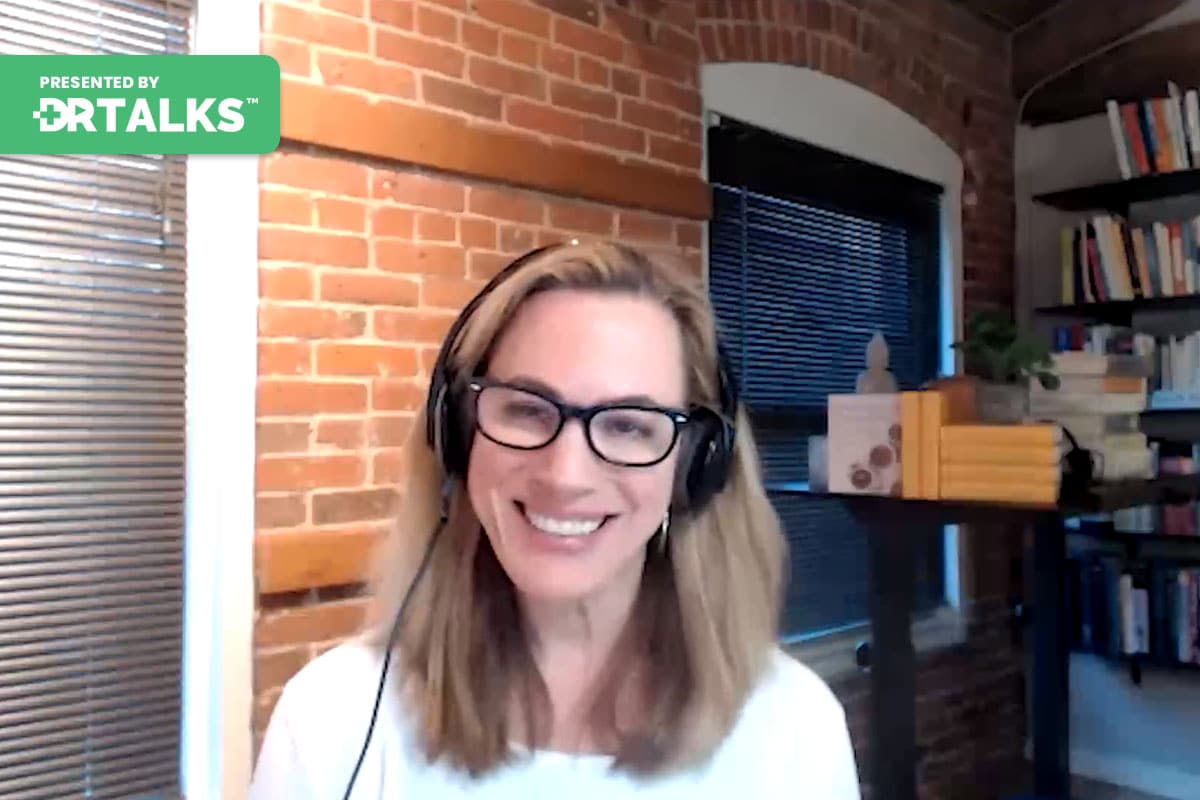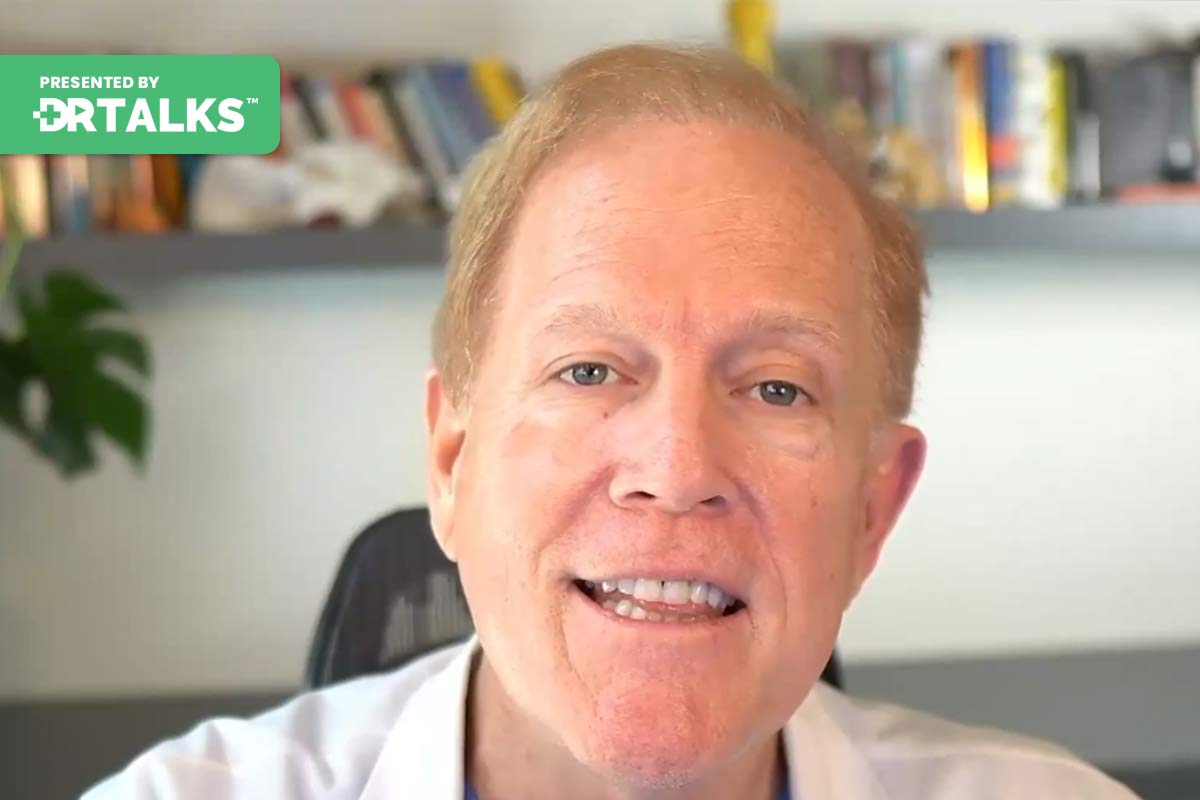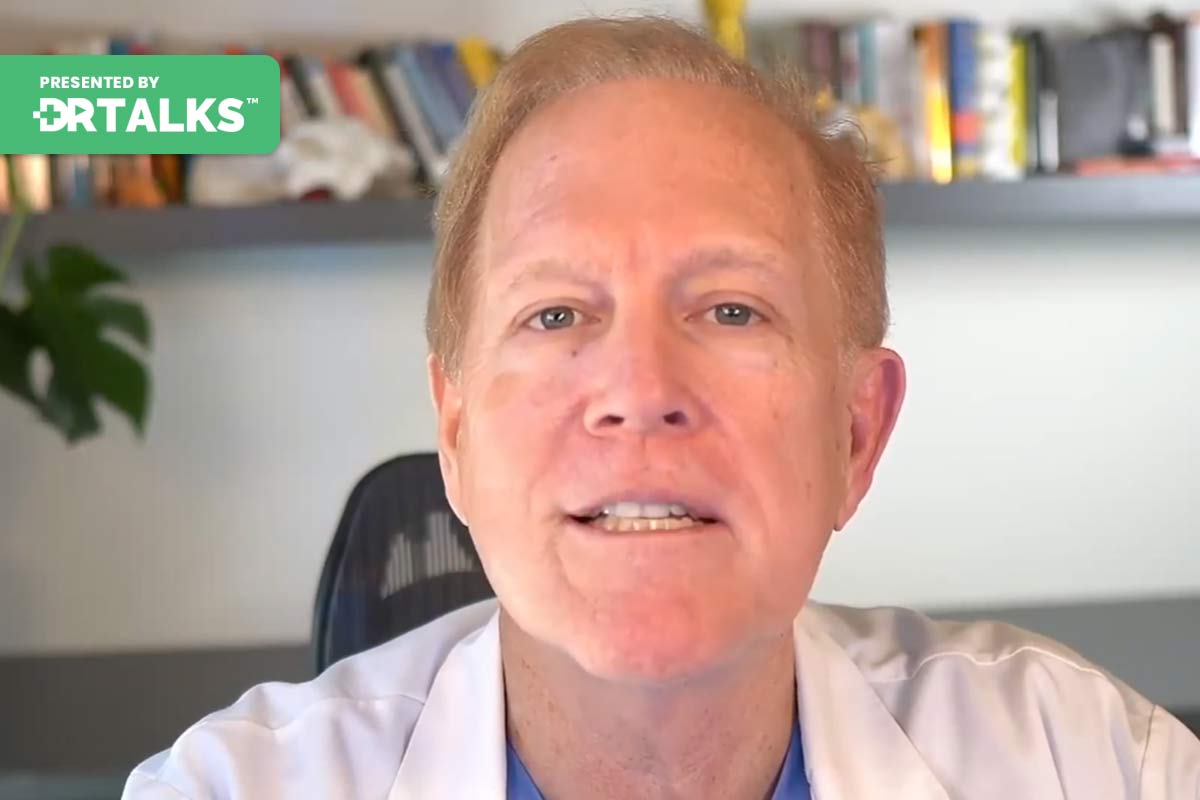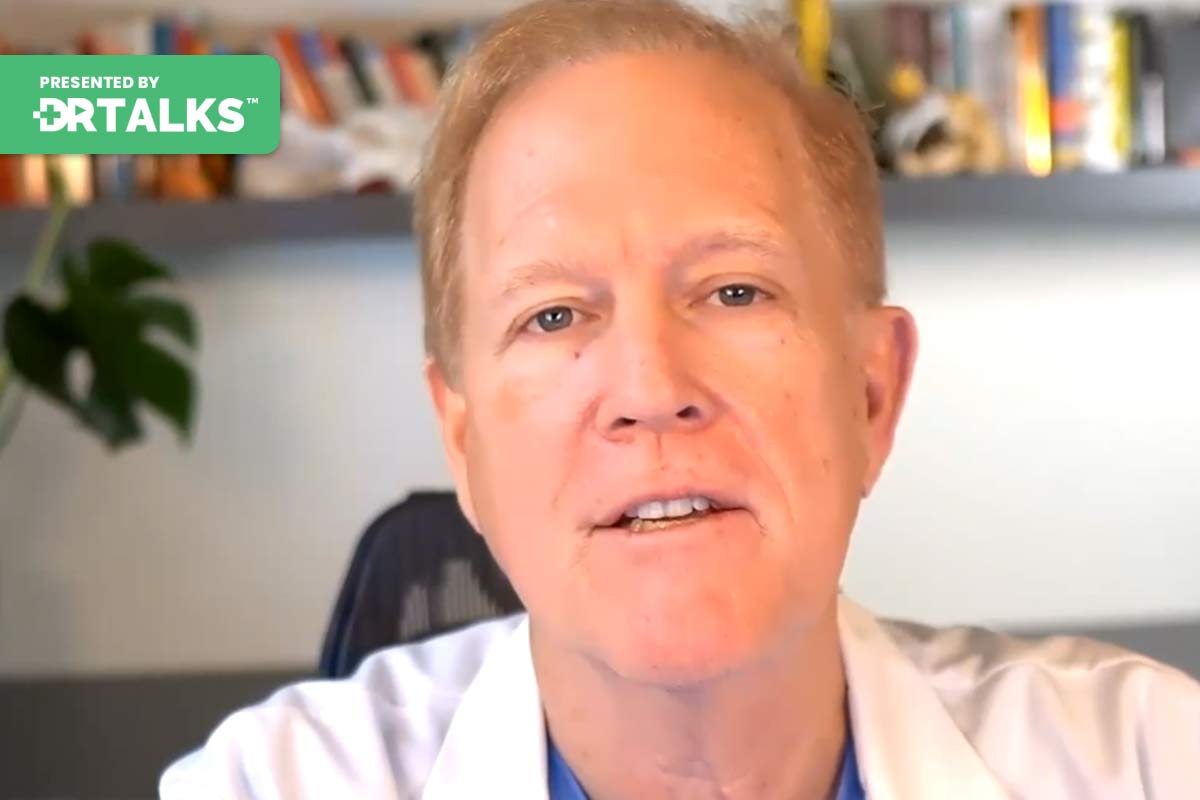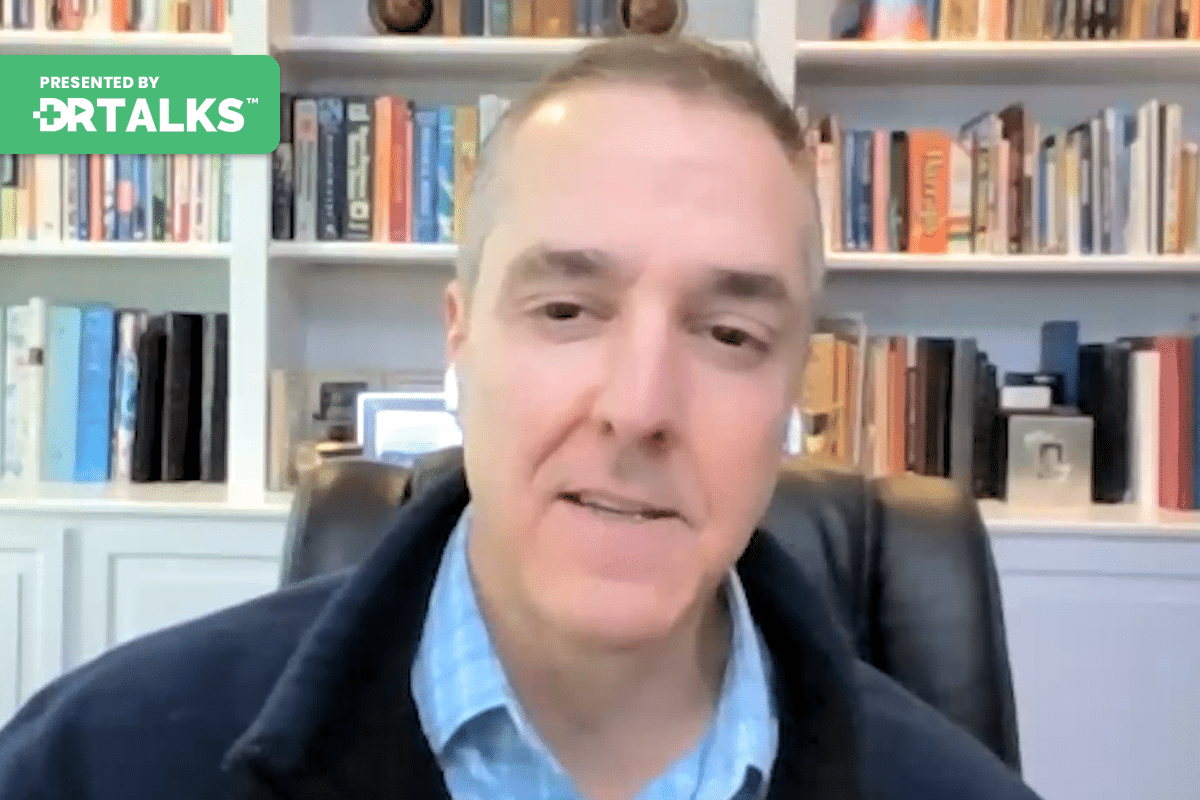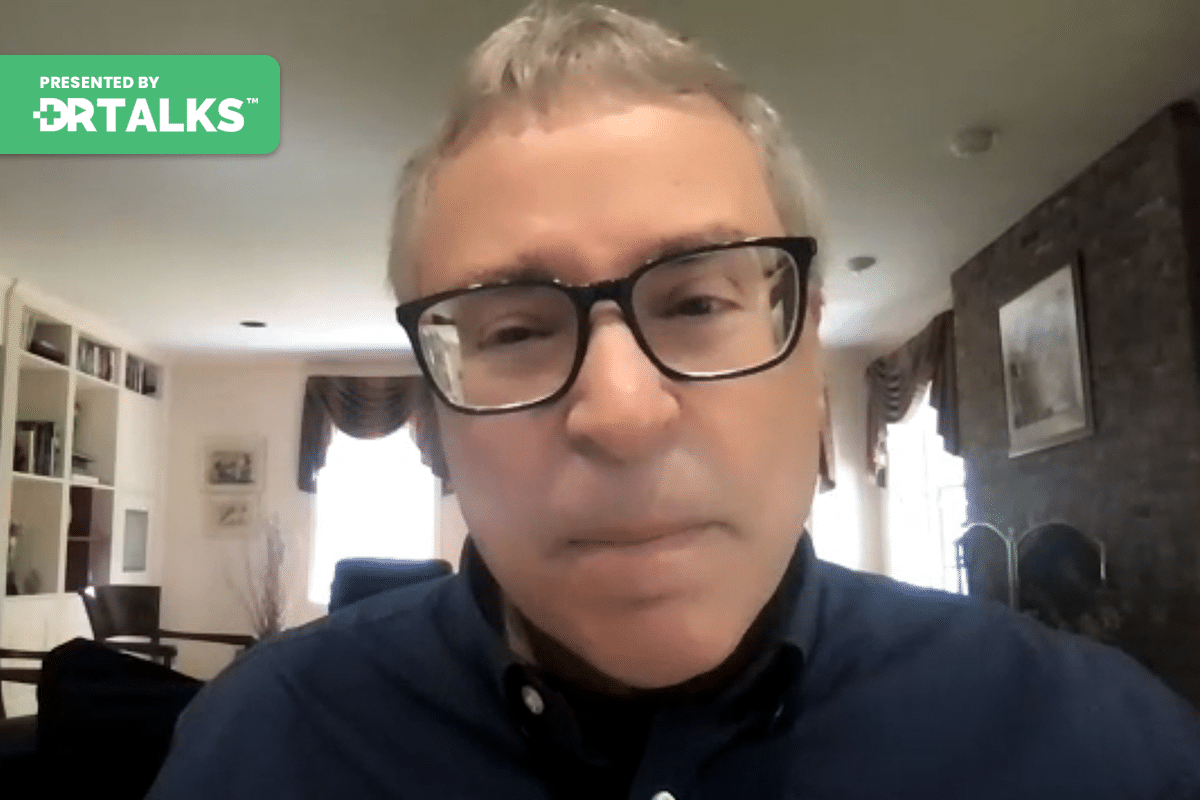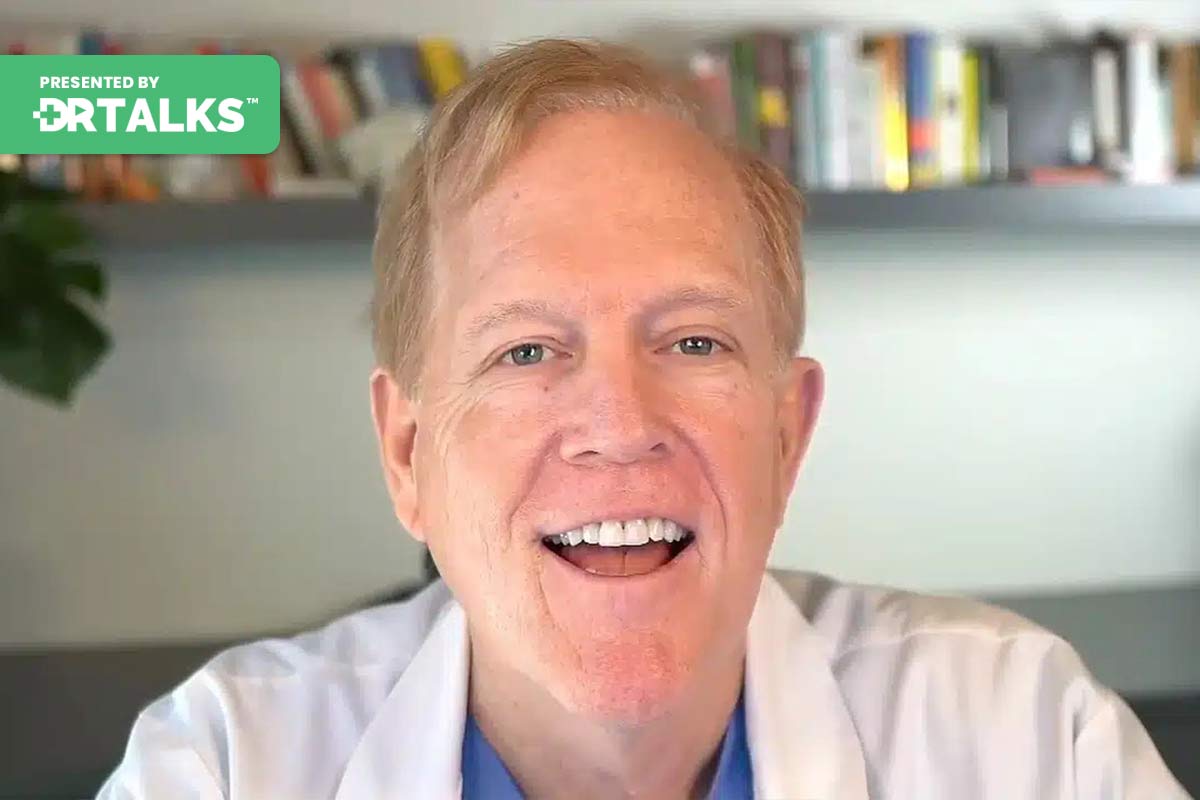Join the discussion below
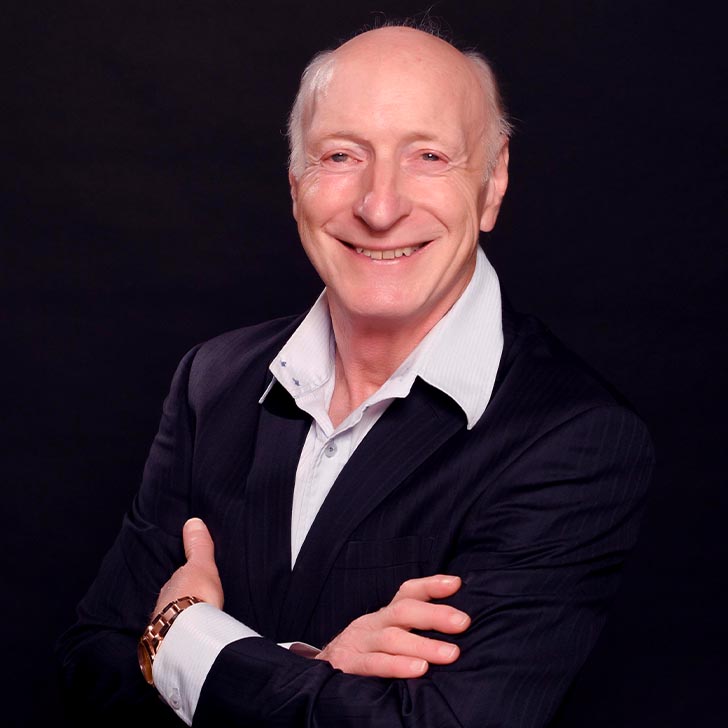
Dr. Stephen Sideroff is an internationally recognized psychologist, executive and medical consultant and expert in resilience, optimal performance, addiction, neurofeedback, leadership, and mental health. He has published pioneering research in these fields. He is a professor at UCLA in the Department of Psychiatry & Biobehavioral Sciences and the Department of... Read More

Kara Fitzgerald, ND, IFMCP, received her doctor of naturopathic medicine degree from the National University of Natural Medicine in Portland, Oregon. She completed the first Counsel on Naturopathic Medicine-accredited post-doctorate position in nutritional biochemistry and laboratory science at Metametrix Clinical Laboratory (now Genova Diagnostics) under the direction of Richard Lord,... Read More
- 3 reasons why your genes don’t dictate your fate
- 6 foods to eat to lower your biological age
- Lifestyle changes to make now to reduce your bio age by over three years in a matter of weeks
Related Topics
Aging, BioHacking, Cancer, Dna Methylation, Epigenetics, Inflammation, Longevity, NutritionDr. Stephen Sideroff
Hi and welcome to another episode of reversing inflammaging Summit body and mind longevity medicine. I’m your host Dr. Stephen Sideroff and I’m very pleased in this hour to have Dr. Kara Fitzgerald who has written and a best selling book called Younger You, in which she describes an eight week study that she engaged in that actually reversed aging by three years. So Kara, it’s such a pleasure to have you here and to talk about this and you know, you have some additional research that I’m going to be checking in with you on as well. But welcome and maybe begin by telling us what got you into this area.
Kara Fitzgerald, ND, IFMCP
Sure, sure, sure. I love so I love going into this uh conversation and I just want to give you permission Stephen to interrupt me, pull me back from the rabbit hole at any time if you have a car or if I need to explain something a little bit more clearly, definitely stop me. And I’m just really comfortable with that and
Dr. Stephen Sideroff
We like you to use you know medical terms where appropriate. And then I’ll make sure you explain it to the audience as well.
Kara Fitzgerald, ND, IFMCP
Perfect. Perfect. So we’re talking about epigenetics my study is was look looking at changes to the epigenome. So I’ll define that out the gate epi above genetics. Our D. N. A. our Genetic material. So these are not so so we were not looking at changes to D. N. A. Or what D. N. A. Was doing or not doing. We were looking at what genes were turned on and what genes were turned off in the field of the science of epigenetic using a diet and lifestyle program? And I just quickly because I think this is so interesting. We you know why did we get into thinking about epigenetics? I mean and it was quite a while ago we got into it around 2016. And in my clinic we created a diet and lifestyle program designed to optimize epigenetic optimized gene expression in our best read on the literature at that time. A lot of animal studies, a lot of you know cell studies there wasn’t a lot of human studies but we wanted to do it and the reason we were concerned about it back then because believe me there in terms of biological age reversal as measured via epigenetic, there was nothing you know, of the sort in 2016 and in fact it was believed pretty pretty aggressively that biological age reversal was not a possibility. So just a few years ago we did not think this could happen in humans.
But the reason we were interested is because can answer actually hijacks gene expression aggressively from us. When you look at the tumor microenvironment, you will see that the cancer takes over gene expression, it turns on genes for its survival, turns off genes that would kill us. And my question as a clinician was you know, what can we do to challenge that phenomenon? And the other question as a doctor was, is there anything that I’m doing as a physician that might negatively promote cancer? You know, now that we can look at epigenetic sit wasn’t you know, this is new for us to be able to see gene expression. And so with those questions, we created this diet and lifestyle program designed originally around a cancer question what we ended up discovering. There were a few incredible aha moments on this journey. One was the changes to the epigenome that cancer induces. Looks like the changes to the epigenome that happens in aging.
I mean, isn’t that crazy? Looks like the changes that happened to the epigenome in cardiovascular disease and diabetes etcetera. There’s a predictable pattern of changes to gene expression as we age. I mean it’s so predictable. We’ve got these extraordinary biological clocks. So when we were already in the middle of our study, in 2019, the first human trial demonstrating biological age reversal was published and this was the trim study and it, you know, was massive. There was just, you know, like the world’s scientific world stopped for a moment and sort of held its breath as this real have they really turned back the hands of time, you know, in this very small uncontrolled group of nine men and it was a year long study and they used pretty strong, you know, they used growth hormone injections and metformin. They used some heavy lifters but it was just breathtaking. We knew that we wanted to look at biological age reversal because we were looking at epigenetics. But prior to that first publication, you know, it was an exploratory component. You know, we didn’t and even then, I mean we didn’t know that we would be reversing it. So we finished. Yeah, go ahead. Yes.
Dr. Stephen Sideroff
Let me just get some clarifying information here. When you say that the changes the epigenetic changes of aging are similar to those with cancer. Can you explain what those are? And does it have anything to do with DNA methylation?
Kara Fitzgerald, ND, IFMCP
Yeah, it does. Thanks so much. Stephen again, interrupt me for clarifying questions as needed. So I just want to back up and say as I’m sure you’ve already talked about on your summit that aging is the biggest risk factor for the chronic diseases of aging. Aging is the biggest risk factor by far, it just dwarfs any other variable. Even smoking when you’re looking at lung cancer, aging does. So there’s these predictable changes that can happen. And they happened, it seems like really one of the root cause drivers is changed to epigenetics. And so again, epigenetic is influencing what’s you know, what D. N. A what genes are on and what genes are off and epigenetic changes are influenced by how we live our lives if we’re eating well sleeping, you know, breathing connected. You know, adequate nutrition and so forth. They influence gene expression. But as we age, certain genes are turned on and certain genes are turned off. You can look at a young epic poem and an old epidemiology and you’ll almost see the equal and opposite. It’s really pretty interesting. So going back to cancer classically in the aging epic poem. These all important suppressor genes. The genes that inhibit that’s protect us from cancer are hyper methylated and inhibited.
So DNA methylation is one of the chief epigenetic marks one of the chief players in turning genes on and off in the literature. A methyl group is a carbon with three hydrogen is if you go back to high school chemistry in the literature there denoted as these red lollipops. And so if you imagine a strand of D. N. A. If you imagine a gene it’s dotted with these red lollipops and that gene is inhibited when there’s a bunch of these methyl groups on that on that, on that promoter region. Conversely, if they’re removed, then that gene can be expressed can be turned on. Or if there are less red lollipops. So as we age, predictably, we start methylated ng for some reason tumor suppressor genes. You know, it’s almost like a raw deal like why, you know, why do we stop protecting ourselves? And we actually start to turn on genes called Anka genes.
And these are in the body of the genes are outside of the promoter region. And these are you know you know viral D. N. A. That complex with us you know millennia ago and these guys actually these promote cancer. And when we’re young we inhibit the gene body region. It’s hyper methylated and shut down. But as we age it gets sloppy and these genes are turned on. So good genes are turned off tumor suppressor genes. You know bad genes are turned on. And then you can actually go down the line and you can see there’s more inflammation. So the whole phenomena of inflammation that you’re talking about when you think about it from a perspective of epigenetic six you can in fact see these pro inflammatory genes are turned on even in the stem, even in stem cells. You know even in these you know these the freshest of the cells. This happens predictably in the aging journey.
Dr. Stephen Sideroff
So I know you’ve used the term hyper methylation and hypermethylation. Can you relate that to this conversation?
Kara Fitzgerald, ND, IFMCP
Yes. So let me go back to these all important tumor suppressor genes. The genes that we want on because they protect us. They suppress tumors. They protect us from getting cancer. So we want them hypo methylated. We don’t want any of those red lollipops on them. We want them on functioning, cleaning us up doing all the work that they need to do to keep us cancer free. And I want to just add sort of an interesting sidebar people will make people who are interested in integrative medicine or functional medicine and have, you know, thought about detox. Maybe they do a detox protocol or maybe they do. They’ve heard of the antioxidant glutathione as you know, one of the main cleaner uppers in our body. That’s to glorify certain beautify on enzymes are actually tumor suppressor genes. And so this and so when you look at what tumor suppressor genes do they do these wide variety of physiologic activities in the body that keep us clean and protect us etcetera, etcetera. But for some reason as we age, we start turning those off and they’re very clearly associated, you know, with once we shut those down with increased risk of cancer when they’re hyper methylated. So they’re guarded with lollipops. So we want to do what we can to hypo methylated those.
Dr. Stephen Sideroff
I’m wondering if you see this process that you’re just describing as a form of programmed death, so to speak, that actually have some evolutionary perspective it’s in our species best interest to die off after we’ve reached reproductive age.
Kara Fitzgerald, ND, IFMCP
Yes,
Dr. Stephen Sideroff
I think that’s something that’s going on there.
Kara Fitzgerald, ND, IFMCP
I do actually do. I mean just because it’s so predictable, you know, and and programmed aging. Uh yeah, so I want to say that my as I’ve as I’ve really gotten deep into this and I was influenced by a friend and colleague josh Middendorf. So he’s an astrophysicist, you know, sort of come bio gerontologist and statistician and he worked with us as an advisor on our study and he wrote a book called cracking the aging code. And that came out in 2016. And it really does pose a pretty strong and compelling argument for aging being a program phenomenon. And when I look at the epigenome , it makes sense. You know, it makes sense to me that it’s not just random damage, there seems to be a real predictable pattern that is occurring. And we also know that when we go and we can also look maybe that the root cause of aging could really be housed in the epic poem as well. We talk about the hallmarks of aging, but is this where it starts? And certainly when we look at, you know, some of the extraordinary research out there using Yamanaka factors like at at Sinclair’s laboratory there directly, you know, changing DNA methylation and methylation and epigenetic expression and reversing age, you know, in an animal model, like like a significantly reversing age. But let me let me stop.
Dr. Stephen Sideroff
Yeah. So I mean it’s an interesting question because I would assume that you have to use different methodology if you want to address wear and tear versus if you want to address program program.
Kara Fitzgerald, ND, IFMCP
Yeah, that’s so bad. Yes. Yeah that’s really interesting. There’s not that many people who say what you say. But yeah, I think that that’s correct. I think both things are true.
Dr. Stephen Sideroff
I would love for you to tell us about your eight week study and I think you’re doing a new one that maybe you have some data on up to at this point. But let’s start with the program that you’ve done.
Kara Fitzgerald, ND, IFMCP
Yes. So this program that we developed, it was designed sort of brick by brick to change DNA methylation. So optimized gene expression. Specifically looking at DNA methylation. So moving around these red lollipops, the intervention is a pretty specific diet. People will be familiar with the nutrients. There’s there’s you know there’s nothing outrageous it’s packed with what we call foods that contain methyl donors. So we need to make the red lollipops. We need the ingredients to make these red lollipops. And those are the foods that are referred to as methyl donor foods. Those foods include green leafy is they include my mushrooms, especially mushrooms like shiitake maitake. But even button mushrooms are good players they include seeds mostly seeds, some nuts. If you’re, you know, animal clean animal protein eggs, liver is a methyl donor superstar. I mean it’s actually extraordinary. It’s a multivitamin and mineral in a food matrix. It is actually for any of those people who are balking at hearing me say liver. It’s the most nutrient dense food that we have. It’s not it’s not it’s our it’s our it’s our oddball. It’s definitely the oddball. You need to get clean source liver. I just want to give a shout out to that. You have to. And I also want to just say that like me, if you’re not, if you can’t cook liver, I don’t really you can take liver and caps so you can get very clean sourced liver and you can just just three caps a day would cover the liver requirements in our program. So lots of edge mushrooms, egg beats, beats or another Methyl donor superstar liver. Some you know, clean source of animal protein whatever you like fish you know, salmon high fatty fish, D. H. A. Helps regulate making these red lollipops. So these are the methyl donors and this is that all of these nutrients are epi nutrients.
So these are nutrients that have evidence in the literature for influencing epigenetics and DNA methylation. Methyl donors in one bucket. And then over here the epi nutrients that we call methylation adapted genes. And these are incredibly important because you’re making the red lollipops over here. But now you want them to go where they should go. Really. You don’t want to shut down your tumor suppressor genes. You know, you don’t want to dabble them with lollipops. And there is some suggestion in the literature that you know supplementing with some of the methyl donors folate in particular has been implicated is in certain vulnerable populations and older populations associated with an increased risk of cancer.
Maybe a piece of that is we don’t know the answer yet is there’s no none of these methods these traffic directors, these methylation adaptions to direct them. You know the method groups where they need to go and these again are a group of foods that people know and love. Most of these foods have really really rich traditional medicinal histories associated with them. Green tea so catty so so E G. C. G. And green tea and the other connections and green tea. One of my favorites actually a little more obscure. My grinder, rosemary. Many spices are these epic nutrient extraordinaire ears, curcumin in turmeric. It’s a wonder kin it’s such a superstar mushrooms again. Going back to these extraordinary you know sort of we say play a traffic, they exert multiple really beneficial effects. Resveratrol, quercetin, Luteolin, lycopene diindolylmethane which is a compound found in abundance and cruciferous veggies, sulforaphane. Another cruciferous superstar. So vitamin D. No surprise right. It’s an epi nutrient wonder kin, vitamin A
Dr. Stephen Sideroff
So these are all elements of your eight week program
Kara Fitzgerald, ND, IFMCP
Reel me back.
Dr. Stephen Sideroff
Are they used within foods that you have been or supplements or?
Kara Fitzgerald, ND, IFMCP
Well in our study we didn’t we did not prescribe any additional supplements except we gave a probiotic which we can talk about why in a minute. And we gave a greens powder. So people got a double dose of these epi nutrients. So we didn’t otherwise use any supplements. Now post original study I absolutely think you know vitamin D. Is essential. There are some foundational supplements that you know any wise eating that program and sort of the next generation younger you program incorporates. But yeah in general we’re getting those from our foods. And in our original study we were sourcing them from foods. So the food. So the new nutrient program is dense and every forkful is full of these epic nutrients. There’s a eating window of 12 hours on 12 hours off. So it’s just a very gentle intermittent fasting structure. I didn’t want to put it more aggressively than that.
I wanted it to be broadly achievable. And that’s something our patients in practice can do. And I also didn’t want the study to be about studying intermittent fasting. It is keto leaning and we dropped triglycerides significantly in our study population. So they likely achieved a little bit of background ketosis where they’re burning fat is what that’s about. We wanted them to hydrate. Well we didn’t require organic but you know clearly if you’re able to that’s that’s a benefit. No grain. It’s a hypoallergenic diet, no lagoon. So in the eight week time, no dairy, no alcohol. So in the eight week time it’s fairly stringent. But after that, you know, one can, can certainly loosen up and we do have a program we call every day younger you, that allows some grain and allow some alcohol and so forth. But in the study, the eight weeks was pretty rigorous.
Dr. Stephen Sideroff
There’s always this balance when you’re doing a research study on, on the one hand, you want to have everything that has a potential to have an effect. On the other hand, you don’t want to make it so stringent that people don’t follow it.
Kara Fitzgerald, ND, IFMCP
So that’s right. That’s right balance in the region. Well, let me talk to you about that. That’s, it’s fun to talk to you. Yes. And so it took us a long time to, to recruit, it was an eight week intervention and it took us a year to actually to actually fully recruit for the study and run it. We had to have a rolling enrollment because yeah, it did. Its multi variable and we haven’t gotten into the lifestyle pieces yet either. The other piece that we did that I’d like to publish on, I’d like to write up our adherence data because they’re good. We are nutrition team worked with them. They were required to have contact with the nutritionists at least weekly, multiple times per week if they wanted to at least to the first month. And then they, you know, they could do by weekly after that. But as far as I was concerned, you know, how often do you get an unrestricted grant as a clinician to go and study a passion project like this? And meta meta genic supported me in this endeavor and I was like we’re going to make this happen. These participants are adhering to this if I have any say. And so we really had our nutrition team hang with them. But I also want to say because it’s kind of funny, you know, you know, as a scientist, we had to have an I. R. B. Approved script so our nutritionists didn’t get in there and you know, coach them with you know, love and attention. They asked them a series of very dry kind of annoying questions. However it still worked because they had that regular contact I think.
Dr. Stephen Sideroff
Yeah. Well yeah that again, that’s always a trade off because whatever you’re doing, you want other people to replicate your results.
Kara Fitzgerald, ND, IFMCP
Yes. Yes, that’s right. There was a group in China that wanted to jump on this and I hope that they do because I certainly anybody, you know, if there’s any research group listening and they’d like to will certainly support them because yeah, of course we want to, we want to see this happen elsewhere.
Dr. Stephen Sideroff
So obviously one of your key independent variables was biological age.
Kara Fitzgerald, ND, IFMCP
Yes.
Dr. Stephen Sideroff
And you found if I get this correctly, you found that the people who participated had a reduction of three years in their biological age. Is that accurate?
Kara Fitzgerald, ND, IFMCP
Yes. As compared to the control group. Yeah. A little bit over three years. And then the within group comparison was two years. So compared to themselves from baseline to the end. Yes.
Dr. Stephen Sideroff
So say a little bit more about the biological measure, the biological clock measurement. And one thing that I’m interested in is what is the reliability of those measures?
Kara Fitzgerald, ND, IFMCP
Yeah. Good.
Dr. Stephen Sideroff
Replica ability of the measures.
Kara Fitzgerald, ND, IFMCP
Yeah. Good question. That’s a good question. So the way that we measure biological age again is looking at the patterns of DNA methylation. We there into third generation clocks. Now it’s a rapidly evolving field at the time we used The first generation there was only the The clock was the one that was most widely used. And it’s actually still very widely used. That looks at 353 different methylation sites. And can you know, and it was trained to predict chronological age. So, you know, they were going for, you know, if you’re if you’re 50, you know, you don’t you could look at a DNA methylation pattern and you know, come really close to saying this person’s 50, they were training it against chronological age. But amazingly it actually turned out to be and it’s still actually really pretty rigorous, a better predictor of morbidity and mortality than chronological ages. So even though it was trained to predict chronological age, it actually predicts morbidity and mortality, you know, more rigorously. And that still seems to be true of this clock even to this day, even as there’s these next generation clocks, there is, you know, using these tools looking at.
You know, there’s I think there’s 29 million methylation sites in the genome in the human genome. I mean these are finicky tools at this point. I mean and and and uh you have to keep control of a lot of variables to get good data. We actually we we worked with Yale, they did our our data processing for all of our specimen and we matched all of our specimen from baseline to the end and sent them out together and even the position on the on the on the on the chip, on the on the array has, you know, has to be consistent and very carefully picked. I mean, this was a huge learning curve for me again, I’m a clinician. So we just, you know, we I worked with most sf out of McGill University, he’s just a really highly regarded epigeneticist. You know, and again, Josh Middendorf helped us with some bio stats. So what do I say about them. I would say that they’re there. You know, you have to hold a lot of variables in control to have a high degree of reproducibility. I mean you just have to be really careful and the quality of the clocks is increasing. So I would say that now we are paying attention to something called the piece of aging. Again it’s looking at DNA methylation but it just seems to be, you know, more reliable and more reproducible. So we’re heading in the right direction. So I think they’re incredibly important tools and there are some, you know, caveats around them.
Dr. Stephen Sideroff
Yeah. I had a conversation with Ryan smith of true diagnostics who was saying that they also have a way, I think you just alluded to it of measuring the rate of aging?
Kara Fitzgerald, ND, IFMCP
That’s right, yes. And that’s a third generation clock. I mean it’s that’s a third generation tool. It’s not technically a clock because it’s looking at the rate of aging but yeah, it’s it’s it’s really cool, it’s a badass tool, we’re using it so carol.
Dr. Stephen Sideroff
I’m curious, we have a reduction in biological age. What about other benefits that the people in your study uh noticed.
Kara Fitzgerald, ND, IFMCP
Yeah. Let me just say something about that because it’s just an interesting point. We looked at other methylation markers. So we looked at the methylation cycle, the various compounds within the methylation cycle. Again, that’s the cycle making the red lollipops. We didn’t significantly change anything in the methylation cycle. We didn’t make more red lollipops relative to the control group. This is particularly interesting to me and a point that I made in our paper that it appeared that we rearranged where methylation was happening in our study group as compared to controls. We rearranged it to a more favorable and youthful pattern which is so cool to me. And then and the next study that the next paper that I wanna we’ll talk about a case a case series in a minute with some newer data.
But the other I want the next paper that I want to write from our original pilot is looking at what they call differential methylation. So we very significantly changed methylation behavior more broadly in our study population in this eight week time frame. And I know just from a very you know cursory analysis that we were able to turn on change methylation status of some of those tumor suppressor genes. We changed methylation status to a host of different genes though. And so that’s just that’s a paper that will you know that will be writing up actually working with true diagnostic group over a true diagnostic there biostatistician is helping with that.
Dr. Stephen Sideroff
I think that’s a very significant finding. Which is that it isn’t a matter of more or less it’s a matter of distribution or where it is.
Kara Fitzgerald, ND, IFMCP
Yeah. I will say that as we age we’re not methylated, we’re not the entire genome. If you were to look at all the methylation sites on the genome, you would see that as we age. There’s a reduction in the total but there’s also a rearrangement to an unhealthy pattern. So again hyper methylation is happening on genes we don’t want to be turned off. So there’s this there’s what they call aberrant methylation, negative methylation changes but then there’s a net loss. So it may be that a better version of the younger you program increases methylation as well as rearranges it. But we didn’t in our first study and that’s fine because we were able to actually show that we moved things around and I just think that that’s really cool. I think that’s a cool a neat finding.
Dr. Stephen Sideroff
So would you say that there’s a natural process within the cell that repairs when there’s a bad methylation shift that occurs. Is there a natural cellular process that looks to correct those things?
Kara Fitzgerald, ND, IFMCP
I think I mean I think as we age there’s there’s yes I mean I think that there is repair happening all of the time but it definitely changes on the aging journey. And so we were providing a lot of information to the epigenome you know, directing traffic and again not just with diet diet every single just it’s extraordinary. Every single fork fall was packed with nutrients that had some evidence to influence gene expression in a favorable way. So everything that they were consuming but sleep also does exercise, does meditation
Dr. Stephen Sideroff
These other parts of your program?
Kara Fitzgerald, ND, IFMCP
Yes. So this was a diet and lifestyle intervention and the diet was you know a big heavy lifter but they had an exercise, a modest exercise prescription of at least 30 minutes, five days a week perceived exertion 60-80% of your of maximum. So you know walking you know and lightly lightly sweating able to convert converse maybe when you’re up at 80% you can still converse but it’s a little bit harder. So you’re you know, so you’re getting a workout in it could be bike riding could be whatever you want. Just hitting a perceived exertion of 60 to 80%. We also had people meditate, there’s and and we also had we wanted people to sleep well. We can’t obviously make them but we gave them sleep hygiene tips. And they would check in with the new tree team on sleep the sleep piece as well.
All of those and I cover it in the book for people who are interested all of them have very compelling research in humans and animals but you know it’s nice that we’re seeing human data here on you know favorably or not influencing DNA methylation and and epigenetic expression and in many cases the aging journey. So practice meditators are biologically younger. But what’s cool is that even one meditation experience which anybody who’s meditated just once knows that it’s all monkey mind and it’s actually kind of a stressful experience. But even that one experience can change genetic expression favorably. It’s really it’s kind of extraordinary. It’s just very very exciting to look at. And I want to say one thing about exercise and then I’ll be quiet exercise acts like a vegetable. Like it turns back on those tumor suppressor genes, those hyper methylated tumor suppressor genes that happen as we age exercise will turn those babies back on. It acts like an epi nutrient. It’s so cool. And it especially works the older we are.
Dr. Stephen Sideroff
Nice. Nice. Well it’s great that some of these things are all of these things really are available to all of us is better sleep nutrition diet. So again with respect to other benefits that the participants found.
Kara Fitzgerald, ND, IFMCP
Yes. So I wanna just will state that we recruited healthy participants. Another reason this study took us a long time to recruit for. So that baseline they needed to be healthy. We weren’t studying diabetes or you know dementia or cancer or you know I. B. S. Or whatever we wanted healthy individual individuals. So they didn’t have high blood sugar. They didn’t have elevated A1C. Et cetera but we did achieve significance in lowering their triglycerides. They weren’t elevate to begin with. But we could see we moved them into ketosis and they dropped we dropped LDL also in total cholesterol as well in the treatment group using the diet intervention. Let me see. We significantly increased folate. So again, no vitamins to be seen in this study. But we increased circulating methyl folate significantly compared to our control group I think by 15% anxiety. You know, these on the quality of life questionnaires. I think we had trends towards lower anxiety and improved energy. You know, but again these guys were were healthy at baseline,
Dr. Stephen Sideroff
You mentioned earlier in the hour something about probiotics and I’m coming back to it because gut health is of course so important now, learning more and more about its importance in both physical as well as emotional and mental health. So was it that you were going to say about that?
Kara Fitzgerald, ND, IFMCP
Well a healthy gut will produce, you know, a multivitamin. I mean it’s really kind of extraordinary. So we can make fully we can make 12, we can make all of the you know, we can make biotin and on and on in a health with a healthy microbiome. And so we wanted to we gave folks lactobacillus plant area which has some evidence that being able to uh produce folate in a in a in a healthy microbiome or stimulate production of folate. And again, you know, we were able to increase circulating methyl folate in our participants. So that may have been a piece of it of course we were giving them a full rich diet, the microbiome. So I’m just I’m talking about it, thinking about the you know the vitamins that it makes that to support us but it’s also acting on all of the foods these epi nutrients and many of them transforming them into the bio active compounds that then are absorbed into circulation and influence. You know, to your earlier point we were talking about uh turning enzymes on and enzymes off that actually can reshape DNA methylation and reshape gene expression. I mean these guys are in there doing the heavy lifting.
Dr. Stephen Sideroff
Beautiful, beautiful. So your results were a three year shift. What’s your opinion on the limits of what can be achieved with what we’re doing?
Kara Fitzgerald, ND, IFMCP
With diet and lifestyle? I mean clearly we’re not going to hit escape velocity at least. I really I don’t think we’re yeah, we’re going to achieve immortality with a diet and lifestyle program. But you know, we can certainly live our best, you know, and longest health span and lifespan by really paying attention and I think there’s something to be said about the design of our program. This this this this these epic epic nutrient density of it when you look at other studies. So you know there’s caloric restriction trials which I’m sure Ryan talked about from two diagnostic. There are studies looking at Mediterranean diet and we do see like some movement to bio age reversal. You know, the Mediterranean diet is a classic healthy eating pattern. Nobody’s gonna argue with that. It doesn’t quite achieve what we saw. And I have to say our study was a pilot. Like we need more data. I want to raise my hand and own that. But I suspect if we’re able to continue to you know see these findings reproducible, reproducible. I suspect it’s two things. It’s the density of the epi nutrients that are on every fork fall. I think that is probably greater than any dietary powder and I’m aware of. But also the combination of the lifestyle components within the whole program.
Dr. Stephen Sideroff
Did you measure in your sample population how much stress they were experiencing? Because stress has a direct impact on uh the immune system on inflammation and all the areas we’re talking about.
Kara Fitzgerald, ND, IFMCP
Now we did look at. So we used quality, you know standard validated quality of life questionnaires like promise. And then we also used a classic functional medicine quality of life questionnaire called the M. Sq medical symptom questionnaire. And there were no well there was actually there was a trend towards Anxiety in our population. It wasn’t explored beyond prescribing a meditation and you know the subjective questionnaires that we had but you’re right you’re you’re absolutely right. I mean the clock that we use just to underscore the stress phenomena. The clock that we used the Horvath, you know, original 2013 clock 25% of it is regulated by a court. So it’s stimulated by the stress response. I mean it’s nuts. And when you look in the literature beyond just biological age, but look at you know, ptsd and sort of heritable trauma. You know, like dutch, hunger winter or holocaust survivors or World Trade Center.
I mean, you can see these classic changes in methylation to google receptors to like the stress stress, the influence of stress is stamped everywhere. And you can see these same changes to these, to these stress genes, these google corduroy jeans and cardiovascular disease and so forth. So it’s just very, when you look at the level of epigenetic you just it’s there. It’s just really interconnected the stress response is matt it maybe. I mean, I would say people ask me on my, you know, in my interviews promoting the book, what’s the biggest of all your variables, what do you think? You know, made the most impact? And of course, I think, you know, at face value the diet, but I’m not sure like I think stress is so massive that it you know, maybe will one day appreciate that it in fact that you could you could survive well into your hundreds on a mcdonald’s diet if you’re really minding your stress. Well, not that I would
Dr. Stephen Sideroff
My model, it modulates every other variable and that’s why it’s so important. Yeah. Great. Well this has been a wonderful conversation. I have just a couple other questions I wanted to ask you, Kara aside from the work that you’re doing, what other things in the area of longevity are exciting you right now.
Kara Fitzgerald, ND, IFMCP
Well, I mean, I certainly have my eyes open and kind of ears to the ground with all of the massive funding happening everywhere. Like I’m very curious what’s going to happen over at the rumored beso slab Altos. You know, he’s recruited the best and brightest scientists from around the, around the globe if it is because I know that’s supposed, I don’t know if he’s affirmed his involvement, but you know, Morgan Levine from Horvath slab and then of Yale and of course Horvath himself and Yamanaka is there now and I’m paying attention to that. Saudi Arabia has dedicated I think a billion dollars a year towards longevity science. I mean, there is a focus on, you know, rapamycin, I’m sure you guys are going to talk about, there’s going to be human trials coming out on that. We’re gonna, you know, Nir Barzalai is looking at, you know, the influence of Metformin, I’m very interested in all of these things. and I think foundationally you can’t avoid, you know, the diet and lifestyle pieces as well. So I and I want to continue and we can talk about it a little bit. I want I want to I’ll continue to chug along with our research, but I am looking at layering these other interventions on time. I mean it’s just it’s just it’s an exciting time in longevity science.
Dr. Stephen Sideroff
It really, yes, it really is. So how can people reach you? What’s your website and I understand you have a bonus gift for our audience that they out to you for?
Kara Fitzgerald, ND, IFMCP
Yes. Yes. So what do we have for my bonus gift? Yes. So go to our website, you can just go to youngeryouprogram.com and actually I think you can just go to youngeryouprogram.com/bioagequiz. And you’ll get to our bio age, you’ll get to our it’s a free bio age quiz. So you can start your investigation into how old you are biologically by taking this and it’s fun. It’s free. It’s you just need to input your email for it. Younger you.
Dr. Stephen Sideroff
Measurement and baseline are always good start.
Kara Fitzgerald, ND, IFMCP
Always always and it’s a really juicy report that will we will send it to you so that you can actually look at areas you can improve on which is huge. Like for me I said, you know, I’m sitting too much, I have a standing, I have a treadmill desk over there and I thought about doing this interview today on my treadmill desk but it’s better for me to sit down for this kind of thing and but sitting you know sitting is is toxic, we know it. And so anyway you’ll get that information and so younger you program dot com bio age quiz. It’s free and it’s really fun and it’s an awesome place to start if you want to actually do the testing that’s available as well. And it’s a blood spot test and you can work with our nutrition team who are incredible human beings. I mean they worked in the study, they continue to work in our research here at the clinic so they know this inside out and backwards so you can get the real blood test if you want to and then meet with a nutritionist and have it individualized for what your needs are.
Dr. Stephen Sideroff
I know you also have a cookbook.
Kara Fitzgerald, ND, IFMCP
yeah so this is called better broths and healing tonics. And this is just another way for you to get all of the fabulous epi nutrients that I’ve been talking about into your life in the most delicious and you know easy and dense nutritionally dense ways actually. And there’s more than just broth. So it’s we’re focused on broads in this but there’s also means and there’s desserts and there’s smoothies, there’s all sorts of really cool stuff but you can just have dense epi nutrient meals as much as you know as much as you’re called to do so.
Dr. Stephen Sideroff
Again Kara your website is?
Kara Fitzgerald, ND, IFMCP
youngeryouprogram.com
Dr. Stephen Sideroff
Ok, great. Well thank you so much for such an informative hours spent together and I’m going to think I’m going to go check out your cookbook.
Kara Fitzgerald, ND, IFMCP
Cool. Alright, that’s awesome. It was really nice to be with you today, Stephen.
Dr. Stephen Sideroff
Thank you.
Downloads

